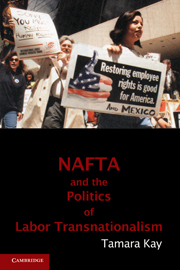Book contents
- Frontmatter
- Contents
- List of Tables
- List of Figures
- Preface
- Acknowledgments
- List of Abbreviations
- 1 Introduction
- PART ONE THE EMERGENCE OF TRANSNATIONALISM
- PART TWO VARIATIONS IN TRANSNATIONALISM
- 6 Missing the Opportunity NAFTA Provided
- 7 Explaining Variation in the Emergence of Labor Transnationalism
- PART THREE CONCLUSIONS
- Appendix
- Bibliography
- Index
6 - Missing the Opportunity NAFTA Provided
Published online by Cambridge University Press: 05 June 2012
- Frontmatter
- Contents
- List of Tables
- List of Figures
- Preface
- Acknowledgments
- List of Abbreviations
- 1 Introduction
- PART ONE THE EMERGENCE OF TRANSNATIONALISM
- PART TWO VARIATIONS IN TRANSNATIONALISM
- 6 Missing the Opportunity NAFTA Provided
- 7 Explaining Variation in the Emergence of Labor Transnationalism
- PART THREE CONCLUSIONS
- Appendix
- Bibliography
- Index
Summary
Although NAFTA stimulated transnational relationships among key union federations and industrial unions by providing a new transnational political opportunity structure that constituted North American actors and interests, not all industrial unions were transformed by its effects. The naysayers who predicted NAFTA would make cross-border collaboration impossible were not completely incorrect. Indeed, the trade agreement did little to generate transnational relationships among U.S. and Canadian unions in the auto, garment/apparel, and trucking industries and their counterparts in official Mexican unions. In addition, the free trade agreement created a rift in the uninspired though cordial relations among the AFL-CIO, CLC, and CTM, and generated significant contention between the Teamsters and CTM trucking unions. Rather than constitute them as regional actors, NAFTA actually underscored the national interests of unions in these industries and generated intense nationalistic sentiments and strategies. In NAFTA's wake, the majority of these unions had some contact and interaction. For most, contact was minimal and interaction intermittent. Labor leaders expressed little if any reluctance to admit poor relations with their counterparts. Ironically, their frankness in revealing this unflattering side of the history, and their unwillingness to paint a rosy picture of harmonious post-NAFTA relationships when they did not exist, strengthens the validity of the data in other chapters that demonstrate NAFTA's catalytic effect on labor relationships.
- Type
- Chapter
- Information
- NAFTA and the Politics of Labor Transnationalism , pp. 199 - 229Publisher: Cambridge University PressPrint publication year: 2011



